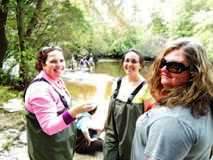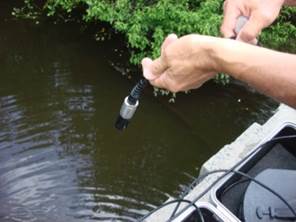|
|
Bureau of Environmental Analysis, Restoration and Standards
Citizen Science
The Citizen Science Program provides opportunities for community engagement through the collection of scientific data that help determine the ecological condition of local waterbodies, as well as the causes and sources of water quality impairment. The information provided by volunteer citizen scientists enables the Department to better understand and evaluate what is happening in New Jersey's watersheds and to make more informed decisions that protect New Jersey’s waterways.
Citizen scientists can collect the following information to determine the health of their watersheds:
- Physical conditions (e.g. flow, temperature, conductivity);
- Biological conditions (e.g. macroinvertebrate community, bacteria, and chlorophyll-a);
- Chemical characteristics (e.g. nutrients, metals); and/or
- Habitat or abundance and diversity of living creatures in the aquatic environment via visual observations.
 
Planners, resource managers, and policy makers need robust high quality scientific data to make the best possible policy decisions. These data may be collected, recorded, and analyzed by volunteers or networks of volunteers working in partnership with trained scientists. Volunteers or volunteer networks are often referred to as Citizen Scientists. Citizen scientists can provide valuable information to supplement data collected by environmental professionals. Scientists then interpret, analyze and assess the data for use in supporting management practices, programs and policies that protect public health, environmental integrity and community assets.
All citizen science monitoring efforts should have a well-defined Study Design. Groups who are just getting started creating a new citizen science volunteer monitoring program can visit the U.S. Environmental Protections Agency’s (USEPA) Monitoring and Assessing Water Quality Volunteer Monitoring website (http://water.epa.gov/type/rsl/monitoring/ and the USEPA Region 2 Citizen Science Web site at http://www.epa.gov/citizenscience/index.html
Those whose objectives include submitting data for use in the Department’s Integrated Water Quality Assessment Report must meet specific data quality requirements, including collecting data in accordance with a Quality Assurance Project Plan (QAPP) that has been approved by the Department or the USEPA. Additional information about citizen science and other volunteer monitoring activities is available from the links below.
For more information, please contact the Bureau of Environmental Analysis, Restoration and Standards at (609) 633-1441.
|
| |
|
For more information, please contact Kimberly Cenno, Bureau Chief,
Bureau of Environmental Analysis, Restoration and Standards at (609) 633-1441. |